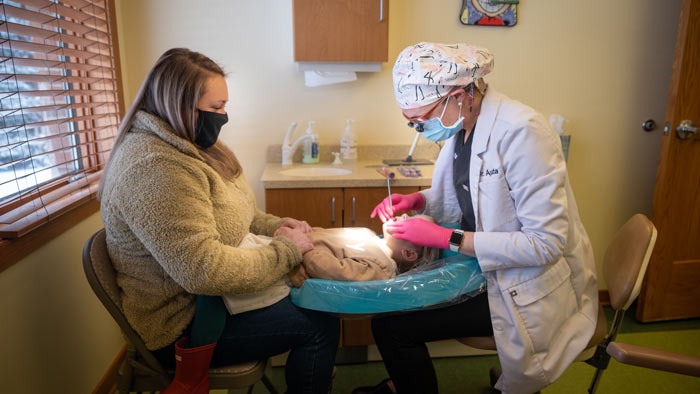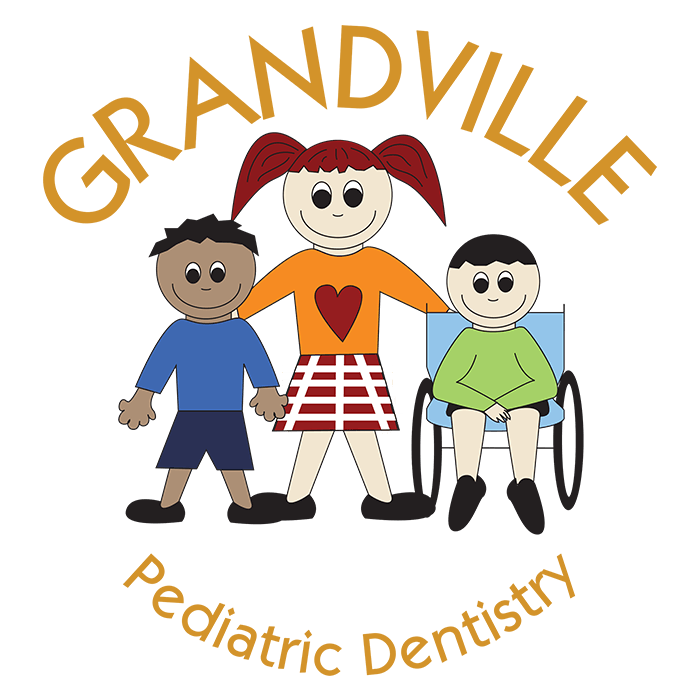
The goal of pediatric dentistry is to help protect your child’s smile every step of the way, from infancy until your child turns 18. However, it’s important to get off to a strong start.
If you’re looking for the right place for your child’s first dental appointment, Grandville Pediatric Dentistry may be right for you. We specialize in early childhood development and can answer all of your questions related to teething, primary teeth, and more.
Why is Pediatric Dentistry Important?
Here’s what you should know about pediatric dentistry.
Teething
Normally, your baby’s will erupt when they are between six to 12 months old.
Gums are sore, tender, and sometimes irritable until the age of three. Rubbing sore gums gently with a clean finger, the back of a cold spoon, or a cold, wet cloth helps soothe the gums. Teething rings work well, but avoid teething biscuits—they contain sugar that is not good for baby teeth.
Infant Tooth Eruption
A child’s teeth actually start forming before birth. As early as four months old, the primary or “baby” teeth push through the gums. The lower central incisors are first, then the upper central incisors. The remainder of the 20 primary teeth typically erupt by age three, but the place and order vary.
Permanent teeth begin eruption around age six, starting with the first molars and lower central incisors. This process continues until around age 21. Adults have 28 secondary (permanent) teeth, or 32 if you include the third molars (wisdom teeth).
Preventing Baby Bottle Tooth Decay
While your baby is teething, it is important to monitor the teeth for signs of . This occurs when babies rely on breastfeeding or bottle feeding in order to fall asleep.
A bottle containing anything other than water that is left in an infant’s mouth while sleeping can cause decay. This happens because sugar in the liquid mixes with bacteria in dental plaque, forming acids that attack the tooth enamel.
Each time a child drinks liquids containing sugar (including breast milk or formula), acids attack the teeth for about 20 minutes. When your baby is awake, their saliva carries away the liquid. During sleep, the saliva flow significantly decreases, and liquids pool around the child’s teeth for long periods, covering the teeth in acids.
To prevent baby bottle decay, be sure to examine your baby’s teeth, especially on the inside or the tongue side, every two weeks. Telltale signs of baby bottle decay include dull spots (whiter than the tooth surface) or lines. Our office is dedicated to fighting baby bottle tooth decay. Let us know if you notice any signs of decay or anything unusual in your child’s mouth.
Your Child’s First Dental Visit
Your child’s first dental visit should be scheduled around their first birthday. The most important part of the visit is getting to know the dentist and becoming comfortable with them and their staff.
A pleasant, comfortable first visit builds trust and helps put your child at ease during future dental visits. If possible, we often allow your child to sit in your lap in the exam room.
Infant’s New Teeth
The primary, or “baby,” teeth play a crucial role in dental development. Without them, a child cannot chew food properly and has difficulty speaking clearly. Primary teeth are vital to the development of the jaws and for guiding the permanent (secondary) teeth into place when they replace the primary teeth around age six.
Since primary teeth guide the permanent teeth into place, infants with missing primary teeth or infants who prematurely lose primary teeth may require a space maintainer, a device used to hold the natural space open. Without a maintainer, the teeth can tilt toward the empty space and cause permanent teeth to come in crooked. Missing teeth should always be mentioned to your family dentist.
The way your child cares for their primary teeth plays a critical role in how they treat their permanent teeth. Children and adults are equally susceptible to plaque and gum problems—hence, the need for regular care and dental checkups.
Why Primary Teeth Are Important
Primary teeth are important for several reasons. Foremost, good teeth allow a child to eat and maintain good nutrition. Healthy teeth allow for clear pronunciation and speech habits. The self-image that healthy teeth give a child is immeasurable. Primary teeth also guide the eruption of the permanent teeth.
Good Diet & Healthy Teeth
The teeth, bones, and soft tissue of the mouth require a healthy, well-balanced diet. A variety of foods from the five food groups helps minimize (and avoid) cavities and other dental problems. Most snacks that children eat cause cavities, so children should only receive healthy foods like vegetables, low-fat yogurt, and cheeses, which promote strong teeth.
Learn More About Pediatric Dentistry
Our , can help your child get a strong start on their oral health journey. To schedule your first appointment, call Grandville Pediatric Dentistry at (616) 531-3430, or contact us online.

